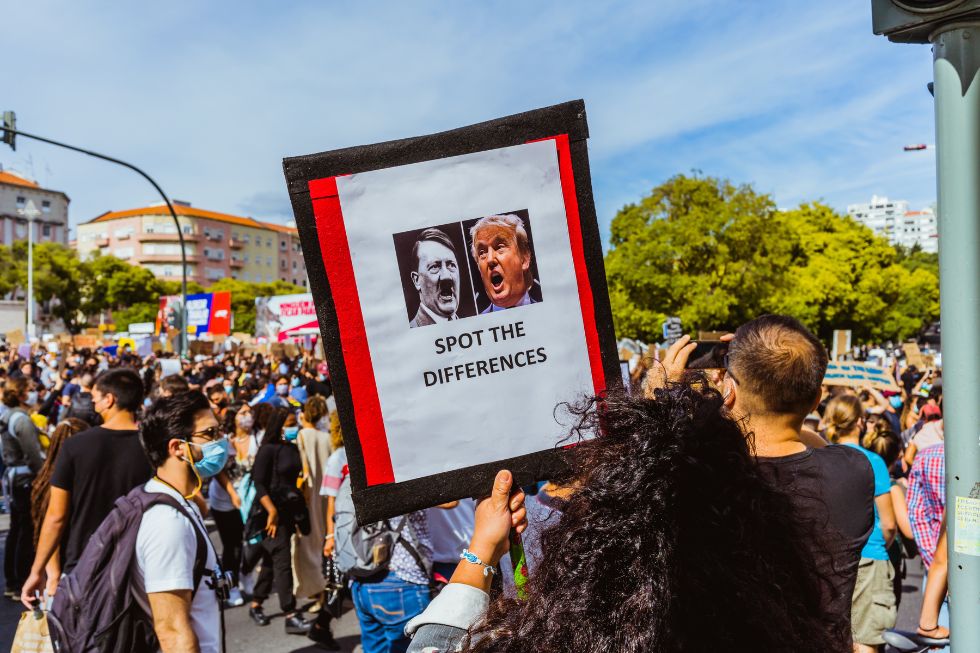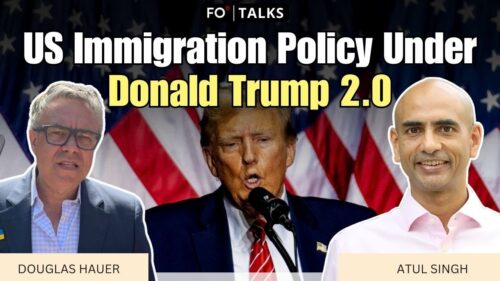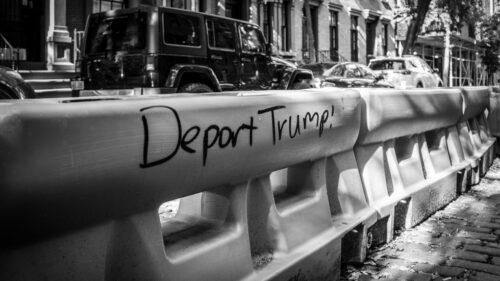In 1852, Karl Marx famously observed that history repeats itself — “first as tragedy, then as farce.” This pattern is relevant today as US President Donald Trump’s actions echo some of humanity’s darkest chapters.
The historical parallels are striking. Preceding World War II, Nazi Germany systematically expelled Jewish citizens, a policy that escalated into the “Final Solution” and Holocaust. On January 20, 2023 — exactly 83 years after Hitler’s extermination order — Trump’s first act back in office was to order mass deportations, including 230,000 Brazilians. His administration’s brutal treatment of deportees, chained and shipped back under inhumane conditions, demonstrates a similar disregard for human dignity.
The similarities extend beyond xenophobia. Trump’s expansionist ambitions toward Panama, Greenland and Canada recall Hitler’s territorial claims in Mein Kampf — both driven by megalomaniacal visions of national greatness. While the scale differs, the underlying mentality bears a disturbing resemblance.
These parallels aren’t mere rhetorical “Nazi cards.” Trump’s inner circle, including Elon Musk and Steve Bannon, have openly embraced neo-Nazi rhetoric and symbols, with Musk recently urging Germans to shed “guilt of the past” while supporting the far-right Alternative for Germany party. History’s warning is clear. The world must recognize these patterns before they escalate beyond farce into renewed tragedy.
The human cost of Trump’s deportation policy
The first deportation flight under Trump’s new policy returned 88 Brazilians in shocking conditions — handcuffed and chained despite a 2021 bilateral agreement prohibiting such treatment except in extreme cases. Reports emerged of mistreatment, including denied food and water and physical violence during the flight, which was diverted to Manaus due to mechanical issues.
When Brazilian authorities removed the restraints at Belo Horizonte airport (as required on national soil), US agents demanded they be reapplied — an unprecedented violation of sovereignty. “We had families, children with disabilities who endured trauma,” noted Human Rights Minister Macaé Evaristo. The incident sparked Brazil’s formal protest and summons of the US chargé d’affaires.
Key context: Biden actually deported more Brazilians (7,168) than Trump’s first term, but Trump’s policy has tripled daily detention rates (956 on January 26 vs. the 2024 average of 311). An estimated 10,000 Brazilians face deportation, with community apps now warning of US Immigration and Customs Enforcement checkpoints. Legal experts note Brazil’s limited recourse beyond diplomatic protests.
The flight wasn’t just about policy — it served as a deliberate spectacle of cruelty, with chains as political theater. As one immigrant network warned: “We’re not criminals. We’re workers who enriched this country.”
International condemnation grows as US deportation tactics spark diplomatic crises
The Trump administration’s aggressive immigration enforcement has ignited a wave of international backlash, with Latin American and Middle Eastern leaders publicly condemning the hardline tactics. The controversial policies — including mass deportations in restraints and proposals to forcibly relocate Gazans — have strained diplomatic relations and drawn comparisons to authoritarian regimes.
The strongest resistance emerged from Colombia, where leftist President Gustavo Petro — a former guerrilla and political prisoner — clashed directly with Trump after refusing to accept deportation flights. The US responded with economic threats, vowing to impose progressive tariffs of up to 50% on Colombian exports.
Petro fired back on social media: “I resisted torture. I will resist you.” The remark, referencing his imprisonment during Colombia’s civil conflict, underscored the deepening rift. Though Bogotá eventually relented under pressure, Trump retaliated by restricting visas for Colombians while declaring victory: “Today’s events have made it clear the world respects America again.”
Honduras also joined the revolt, with President Xiomara Castro convening an emergency meeting of the Community of Latin American and Caribbean States. She warned of expelling US military bases — a direct challenge to Washington’s regional influence.
The backlash extended overseas after Trump suggested Egypt and Jordan should absorb Palestinian refugees from Gaza, which he called a “demolition site.” Palestinian leaders immediately rejected the idea as ethnic cleansing, aligning with the Israeli far right’s goal of depopulating Palestinian territories. “This land is ours, inherited from our ancestors. We won’t leave except as corpses,” said one Gazan resident. Jordan — already hosting 2.5 million Palestinian refugees — also dismissed the plan, fearing further destabilization amid fragile ceasefire talks.
Trump’s immigration policies gain domestic support despite economic and historical contradictions
Recent polling shows a growing divide between global criticism of Trump’s immigration crackdown and its increasing popularity among Americans. According to a Reuters/Ipsos survey, 47% of Americans approve of his early actions — a higher rating than during much of his first term — with 58% supporting severe reductions in asylum seekers at the border.
Yet these hardline measures overlook the essential role immigrants play in the US economy. Though often portrayed as criminals, undocumented immigrants make up just 23% of the foreign-born population, far outnumbered by naturalized citizens (49%), permanent residents (24%) and temporary visa holders (4%). Their economic impact is disproportionate: They account for 17% of the workforce while representing only 14% of the population, filling critical roles in agriculture (70%), healthcare (28%) and entrepreneurship (23%), particularly in tech and engineering.
Immigrants pay $600 billion in taxes annually and are projected to add $9 trillion to the US GDP over the next decade.
The policies also clash with Trump’s own family history. His grandfather arrived as an unaccompanied, undocumented teenager from Germany, while his mother immigrated from Scotland with little money — neither would meet the strict citizenship requirements he now proposes.
Economists warn that such protectionist measures may backfire. “These policies will provoke trade retaliation,” notes Fabio Ongaro of the Italian Chamber of Commerce, urging countries like Brazil to prepare by investing in infrastructure and competitiveness. As the administration pushes forward, the long-term economic costs of these popular but shortsighted policies remain to be seen.
[Tara Yarwais and Lee Thompson-Kolar edited this piece.]
The views expressed in this article are the author’s own and do not necessarily reflect Fair Observer’s editorial policy.
Support Fair Observer
We rely on your support for our independence, diversity and quality.
For more than 10 years, Fair Observer has been free, fair and independent. No billionaire owns us, no advertisers control us. We are a reader-supported nonprofit. Unlike many other publications, we keep our content free for readers regardless of where they live or whether they can afford to pay. We have no paywalls and no ads.
In the post-truth era of fake news, echo chambers and filter bubbles, we publish a plurality of perspectives from around the world. Anyone can publish with us, but everyone goes through a rigorous editorial process. So, you get fact-checked, well-reasoned content instead of noise.
We publish 3,000+ voices from 90+ countries. We also conduct education and training programs
on subjects ranging from digital media and journalism to writing and critical thinking. This
doesn’t come cheap. Servers, editors, trainers and web developers cost
money.
Please consider supporting us on a regular basis as a recurring donor or a
sustaining member.
Will you support FO’s journalism?
We rely on your support for our independence, diversity and quality.











Comment